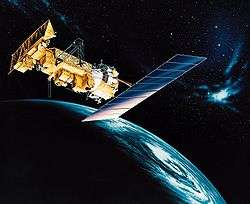Meteorological-satellite service

Meteorological-satellite service (also: meteorological-satellite radiocommunication service) is – according to Article 1.52 of the International Telecommunication Union´s (ITU) Radio Regulations (RR)[1] – defined as « An earth exploration-satellite service for meteorological purposes.»
- See also
- Main articles: Radio station and Radiocommunication service
Classification
This radiocommunication service is classified in accordance with ITU Radio Regulations (article 1) as follows:
Fixed service (article 1.20)
- Fixed-satellite service (article 1.21)
- Inter-satellite service (article 1.22)
- Earth exploration-satellite service (article 1.51)
- Meteorological-satellite service
Frequency allocation
The allocation of radio frequencies is provided according to Article 5 of the ITU Radio Regulations (edition 2012).[2]
In order to improve harmonisation in spectrum utilisation, the majority of service-allocations stipulated in this document were incorporated in national Tables of Frequency Allocations and Utilisations which is with-in the responsibility of the appropriate national administration. The allocation might be primary, secondary, exclusive, and shared.
- primary allocation: is indicated by writing in capital letters (see example below)
- secondary allocation: is indicated by small letters
- exclusive or shared utilization: is within the responsibility of administrations
- Example of frequency allocation
| Allocation to services | ||
| Region 1 | Region 2 | Region 3 |
401-402 MHz METEOROLOGICAL AIDS
| ||
8 175-8 215 MHz METEOROLOGICAL-SATELLITE (Earth-to-space)
| ||
References / sources
- ↑ ITU Radio Regulations, Section IV. Radio Stations and Systems – Article 1.52, definition: meteorological-satellite service / meteorological-satellite radiocommunication service
- ↑ ITU Radio Regulations, CHAPTER II – Frequencies, ARTICLE 5 Frequency allocations, Section IV – Table of Frequency Allocations
- International Telecommunication Union (ITU)
- Earth exploration-satellite service. ITU, Genf 2011. ISBN 92-61-13761-X